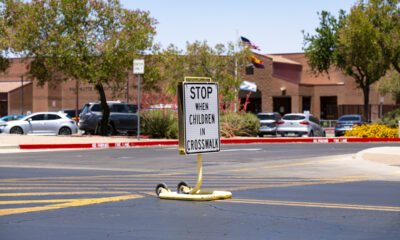Aaron Dunton
Sexual Groomers in Schools Face Consequences as New Law Takes Effect Next Month

By Tamra Farah |
Concerns regarding sexual grooming and inappropriate educational agendas in Arizona schools have escalated. A recent report by the Department of Education highlighted troubling cases of sexual misconduct, while the Arizona Education Association (AEA) has faced scrutiny over its potential influence on school policies.
Not in Our Schools has raised alarms about the promotion of LGBTQ and social justice agendas within Arizona school systems, particularly in Mesa Public Schools (MPS). Reports indicate that some educators, despite new district regulations limiting involvement in non-academic clubs, continue to integrate LGBTQ-related materials into their classrooms.
Specifically, teacher Tami Staas has been accused of introducing LGBTQ+ symbols and discussions about pronouns without parental consent. Critics argue these actions represent a form of “grooming,” as they potentially expose students to gender transitioning concepts under the radar of parental oversight.
The AEA is also under fire for allegedly prioritizing social agendas over academic performance and influencing school board elections in support of these initiatives. Allegations suggest that AEA has been involved in promoting legislation favoring abortion access and gender transitioning policies in schools. Parents are urged to research candidates thoroughly before participating in upcoming school board elections to protect their children’s interests.
Further complicating the scenario is the incorporation of social-emotional learning (SEL) frameworks, which some claim are being used to promote LGBTQ lifestyles. Programs like “Everybody Matters” reportedly undermine parental authority while advancing these agendas. In addition, the Mesa Public Schools Governing Board is criticized for endorsing initiatives perceived as detrimental to family structures.
Past incidents underscore these fears. Aaron Dunton, a former teacher at Higley High School, faced multiple allegations of inappropriate conduct with students, culminating in his resignation after being investigated for an alleged relationship with a 14-year-old. His case highlights the broader issue within Arizona’s educational system, characterized by an alarming 184% rise in sexual misconduct cases from 2012 to 2023, as reported by the Arizona Department of Education.
To address such misconduct, Representative Travis Grantham introduced HB2310, known as the Child Enticement Bill or anti-grooming bill. Set to take effect next month, it intensifies legal protections for minors against solicitation and grooming, including actions communicated electronically. This legislative effort aims to enhance penalties for such offenses, providing crucial safeguards for children across Arizona.
Despite the potential impact of this legislation, the onus remains on Arizona’s school districts and the Department of Education to enforce accountability and protect students effectively. Parents play an essential role by educating their children about safe behaviors and encouraging open dialogue about risks encountered both at school and online.
Experts recommend several strategies for parents to advise their children:
1. Understand Consent and Boundaries: Teach children the importance of consent and personal boundaries, ensuring they are aware of inappropriate conduct’s consequences.
2. Be Mindful of Online Behavior: Promote critical thinking regarding online interactions. Discuss the importance of privacy, and the severe risks associated with sharing personal information.
3. Report Suspicious Behavior: Encourage children to report any inappropriate behavior they witness immediately to trusted adults or via anonymous channels, emphasizing the importance of safety.
4. Stay Informed About Friendships and Relationships: Urge children to choose friends who respect boundaries and to confidently decline uncomfortable situations.
5. Learn About the Law: Help children understand relevant legal implications surrounding age differences in relationships and online safety.
6. Practice Digital Safety: Remind children to safeguard their online accounts and personal information, avoiding conversation with strangers that could turn inappropriate.
By empowering children with knowledge and awareness, parents can help foster safe and responsible behavior in schools. This is critical in aligning their actions with Arizona’s legal framework designed to protect minors.
Tamra Farah brings over twenty years of experience in public policy, focusing on individual liberties and promoting limited government. She has held leadership positions in various organizations and currently heads SMART Families Network at Arizona Women of Action.


















